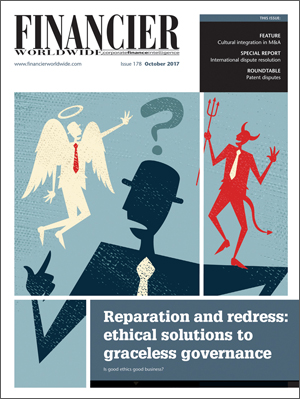OPBAS set to boost AML in the UK
October 2017 | FEATURE | FRAUD & CORRUPTION
Financier Worldwide Magazine
A scourge on professional services at all ends of the spectrum, global money laundering transactions have been estimated to equate to 2 to 5 percent of global gross domestic product (GDP) or approximately $1 to 2 trillion per year.
A scam that can destroy economic value as well as the reputation of those caught in the web, money laundering facilitates economic crime and heinous activities – including corruption, terrorism, tax evasion and drug and human trafficking – by holding or transferring the funds necessary to commit such crimes.
Increasingly being treated as a priority issue by governments, the fight against money laundering is supported by an array of anti-money laundering (AML) initiatives across the globe, with a new Office for Professional Body Anti-Money Laundering Supervision (OPBAS) a recent addition to the stable in the UK – a country described by the 2016 ‘UK Action Plan for Anti-Money Laundering’ as unique in terms of the number and diversity of its supervisory bodies.
OPBAS has been introduced by the government to oversee the adequacy of the plethora of AML supervisory arrangements in the UK (there are currently 25 AML supervisors in the UK). It has been invested with the power to censure and remove AML supervisors that do not adhere to the standards set out in the 2017 Money Laundering Regulations (MLR), which came into force on 26 June 2017.
“The UK is a world-leader in the fight against corruption, money laundering and terrorist financing, but more can be done,” said Simon Kirby, the now former economic secretary to the Treasury. “OPBAS will bring the UK’s AML regime into line with the latest international standards, and ensure consistently high standards of supervision across all sectors; sending a strong message that money laundering and terrorist financing should not and will not be tolerated.”
Mandate and powers
OPBAS is to be housed within the Financial Conduct Authority (FCA) and operate according to FCA governance arrangements. It is designed to address inconsistencies in the current supervisory regime established by the ‘UK national risk assessment (NRA) of money laundering and terrorist financing’(2015), analysis which identified extensive gaps in the UK’s AML provision.
“The addition of OPBAS may well prove to be the missing piece in the UK government’s AML jigsaw as it steps up its fight against economic crime.”
“OPBAS will have powers to help and ensure professional body AML supervisors meet the requisite standards,” explains Caroline Day, a partner at Kingsley Napley LLP. “These include the powers to publicly censure or recommend that the Treasury remove professional bodies that do not comply with their requirements in the MLR. There will be complementary safeguards so that professional bodies have opportunities to engage with OPBAS before any penalty is issued and, if necessary, to appeal a decision. OPBAS will issue a set of anti-money laundering guidance for each sector.”
Appropriate balance
Although the standardisation of AML guidance for business sectors, a reduction in the number of guidance documents and an easing of regulatory burdens has been welcomed by many companies, at the same time, concerns have been raised as to whether OPBAS strikes an appropriate balance between benefits and additional red tape.
“Effective liaison between OPBAS and the supervisory bodies to share good practice and avoid conflicts would be a positive development,” says Ms Day. “In theory, the knowledge that you are complying with one set of guidance should also simplify risk process and the compliance burden. However, the introduction of OPBAS will inevitably result in further bureaucracy and cost for affected supervisory bodies and no doubt this will filter down to the professions.”
Persuasive argument
Given that OPBAS is not expected to be operational until early 2018, an assessment of its likely impact can be no more than conjecture at this stage. Even so, the contrast between OPBAS shaking up AML in the UK or proving to be one supervisory body too many is compelling.
“There is an argument that the introduction of one body to oversee a diverse group of supervisors will introduce coherence into the regime, particularly if this leads to an improvement in information sharing and a consistent approach to risk assessment – although this is limited as OPBAS’s powers will only cover the relevant professional supervisory bodies and not extend to statutory supervisors,” says Ms Day. “The FCA confirmed that OPBAS’s approach will be to develop a sound understanding of the workings of the different bodies and sectors they supervise. That said, there is a risk that sector-specific knowledge and experience may be lost and the model of self-regulation of the professions may be compromised. It is too early to tell whether an appropriate balance will be struck.”
Aligned with the MLR, FCA guidance and the risk-based approach being adopted by supervisory resources, the addition of OPBAS may well prove to be the missing piece in the UK government’s AML jigsaw as it steps up its fight against economic crime.
© Financier Worldwide
BY
Fraser Tennant

